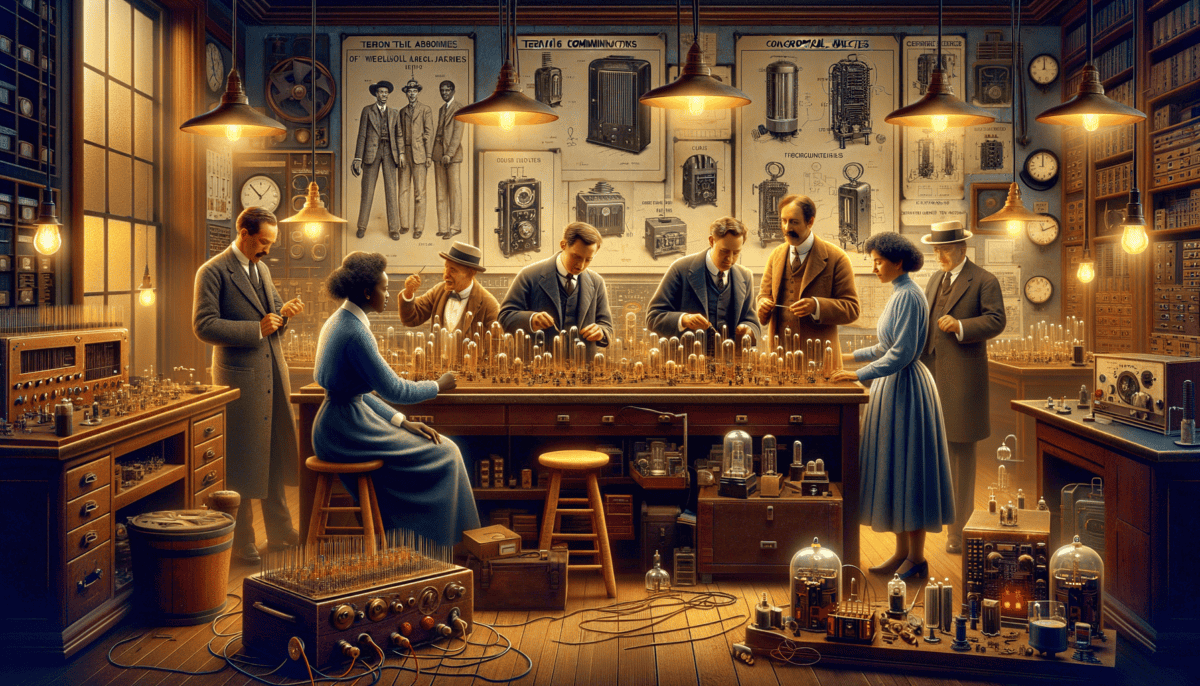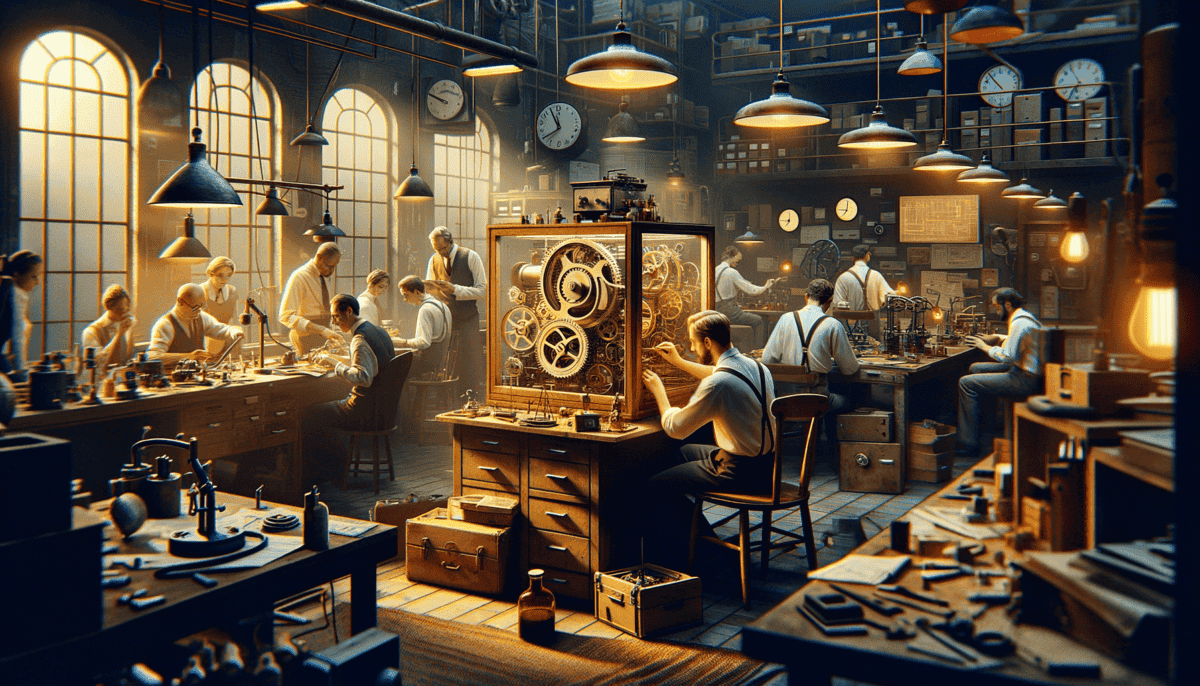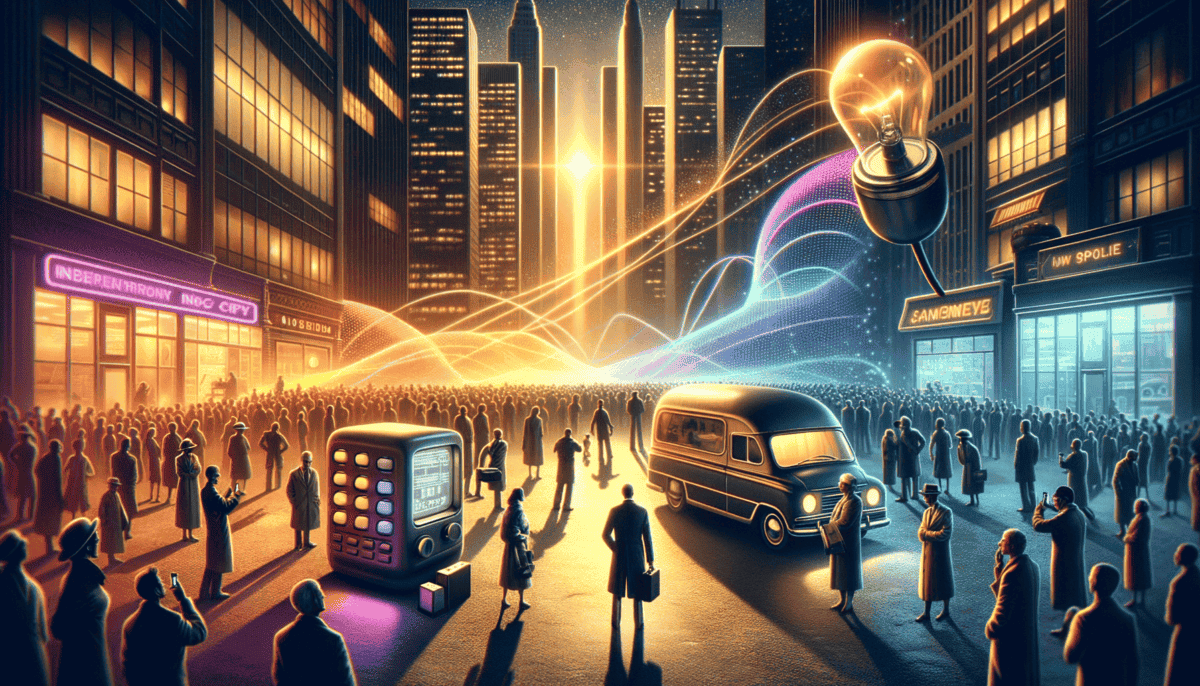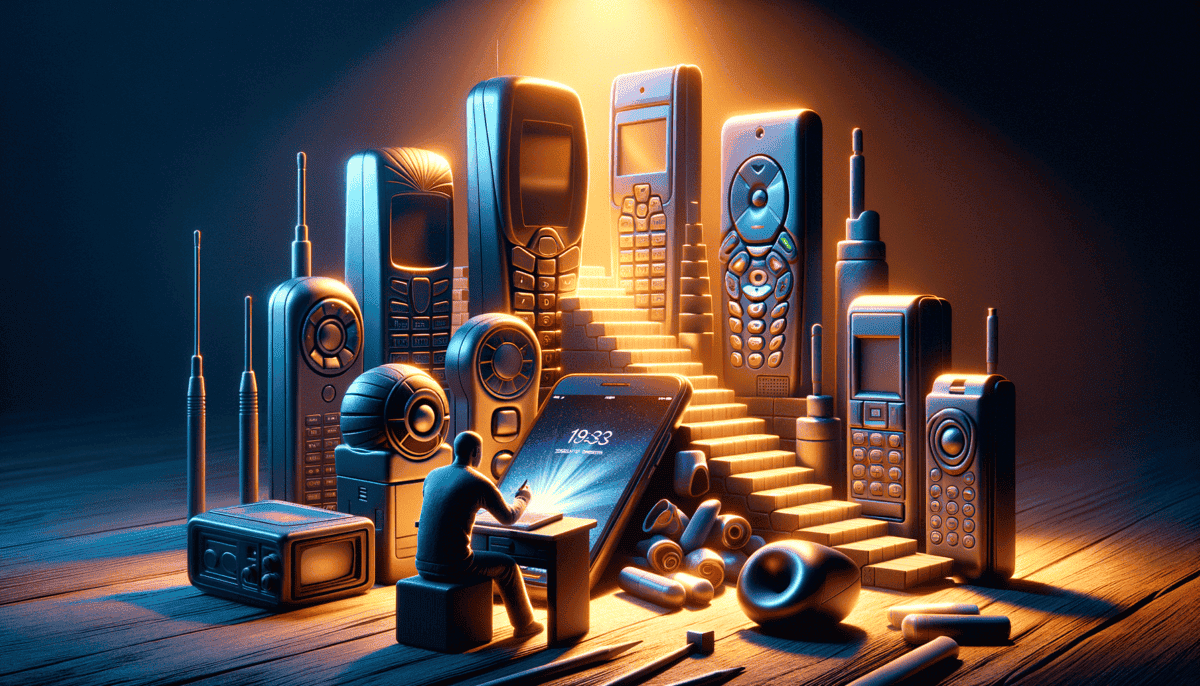Whispers of Wireless
Little Tommy sat by his grandfather's rocking chair, eyes wide with wonder. "Grandpa, how did people talk to each other when you were young?"
Grandpa smiled and leaned forward. "Well, Tommy, back in 1875, people couldn't just pull out a phone and call someone whenever they wanted. They had to write letters or use something called a telegraph."
"What's a telegraph?" Tommy asked, scrunching his nose.
"It was like sending text messages, but with beeps and dots!" Grandpa chuckled. "Click-click-click would mean different letters. But it wasn't very easy to use."
Tommy's eyes grew bigger. "That sounds hard! But how did we get to phones?"
"Well, it all started with a very special man named Nathan B. Stubblefield," Grandpa explained. "He lived on a farm in Kentucky and had a big dream. He wanted to make people talk to each other without using wires!"
"Like magic?" Tommy bounced in his seat.
"Almost! In 1892, Nathan did something amazing. He made a box that could send voices through the air using invisible waves called radio waves. He would take his invention to fairs and shows, and people couldn't believe their ears!"
The Big Dream
"But Nathan had an even bigger dream," Grandpa continued. "He wanted people to carry their talking boxes with them wherever they went. Just like the phones we have today!"
Tommy pulled out his mom's phone from his pocket. "Like this?"
"Exactly! But back then, people thought it was impossible. The machines were too big, too heavy, and needed lots of power to work."
• Making the machines smaller
• Finding better power sources
• Creating stronger signals
• Building more towers to send signals
"Did people laugh at Nathan's idea?" Tommy asked quietly.
"Some did," Grandpa nodded. "But Nathan kept working hard. He knew that someday, people would want to talk to their friends and family from anywhere in the world."
The First Steps
"Nathan's work was like planting a seed," Grandpa said, gesturing to the garden outside. "Just like how a tiny seed grows into a big tree, his ideas grew into something amazing."
Tommy looked thoughtful. "So he made the first phone?"
"Not exactly. But he showed everyone that wireless talking was possible. He proved that voices could travel through the air without wires. That was very important!"
"Other scientists and inventors saw what Nathan did and got excited. They started working on their own ideas. Some tried using different kinds of waves. Others made new ways to make signals stronger."
"Like teamwork?" Tommy asked.
"Exactly like teamwork! Each person added something new. It was like building a giant puzzle, and everyone had different pieces to add."
"I wish I could thank Nathan," Tommy said softly.
Grandpa smiled warmly. "Well, every time you use a phone, you're making his dream come true. He helped start something that changed the whole world."
The sun was setting outside, painting the sky in beautiful colors. Tommy looked at the phone in his hand with new eyes, imagining all the scientists and dreamers who helped make it possible.
"Ready for more of the story tomorrow?" Grandpa asked with a twinkle in his eye.
Tommy nodded eagerly. "Yes, please! I want to know what happened next!"
Dreams Take Flight
Tommy couldn’t wait for his next chat with Grandpa. He ran to the rocking chair, nearly tripping over his feet. “Tell me more about the phone story!”
Grandpa’s eyes twinkled. “Ah, now we’re going to talk about some very special people who worked at a place called Bell Laboratories. “
The Magic Workshop
“What’s Bell Laboratories?” Tommy asked, settling into his usual spot.
“Think of it like a big workshop where very smart people tried to make talking easier for everyone. They worked there day and night, testing new ideas.”
“In 1947, something amazing happened,” Grandpa continued. “They found a way to split up a city into small parts called ‘cells.’ This meant more people could use phones at the same time!”
Tommy looked confused. “Like breaking a cookie into smaller pieces?”
“Exactly! Instead of one big signal trying to reach everyone, they made lots of smaller signals. It worked much better!”
Radio Stars
“But before phones could work without wires, people used something called radio phones,” Grandpa explained. “They were big and heavy – like carrying a brick! “
“Could you put them in your pocket?” Tommy giggled.
“No way! They were so big, they had to stay in cars. And only a few people could use them at once. If someone else was talking, you had to wait your turn!”
• Very heavy and big
• Used lots of power
• Only worked in some places
• Too expensive for most people
The Problem Solvers
“But clever scientists kept trying to make things better,” Grandpa said. “They were like superheroes, but instead of fighting bad guys, they fought big problems!”
“Did they wear capes?” Tommy asked excitedly.
Grandpa laughed. “No capes, but they had something better – great ideas! They found ways to make signals travel farther and worked on making the phones smaller.”
“Every time someone said ‘impossible,’ these inventors just worked harder!” – Grandpa
Race to the Future
“Different companies started racing to make the first real mobile phone,” Grandpa continued. “It was like a big contest!”
“Who won?” Tommy bounced in his seat.
“Well, that’s a story for next time,” Grandpa winked. “But I’ll give you a hint – it involves a very special company called Motorola.”
Tommy looked at his mom’s phone again. “I bet those old inventors would be really happy to see our phones now.”
“They sure would be,” Grandpa smiled. “Each one of them helped build the future we live in today.”
“Can we hear about Motorola tomorrow?” Tommy asked hopefully.
“Of course! That’s when things get really exciting!” Grandpa promised, as the evening sun painted long shadows across the floor.
Racing to Tomorrow
“Motorola!” Tommy shouted as he burst into the living room. “You promised to tell me about Motorola!”
Grandpa chuckled. “I sure did! And this part of the story has a very special hero named Martin Cooper.”
A Man with a Dream
“Martin worked at Motorola. He had a big dream – he wanted to make a phone that people could carry anywhere!” Grandpa explained.
“Like the one Mom has?” Tommy asked.
“Yes, but back then, people thought it was impossible. They said phones needed to stay in cars.”
The Big Challenge
“Martin got a special team together at Motorola,” Grandpa continued. “They worked super hard to solve three big problems:”
• Make the phone small enough to hold
• Make the battery last longer
• Make it work everywhere
“Was it hard?” Tommy wondered.
“Very hard! Some people at Motorola didn’t think it would work. But Martin kept saying, ‘We can do this!'”
The Secret Project
“Martin’s team worked in a special room,” Grandpa said mysteriously. “They called it the ‘skunk works.'”
Tommy giggled. “Did it smell bad?”
“No, no! It was just a fun name for their secret workshop. They worked day and night for three months straight!”
“Sometimes the biggest dreams take the most work!” – Martin Cooper
The Magic Box
“They made lots of different test phones,” Grandpa explained. “Each one got better and better. The first ones were as big as shoeboxes!”
“But they kept making them smaller?” Tommy asked.
“Yes! And they had to make sure it could work without getting too hot or running out of power too fast.”
The Big Race
“There was another big company called AT&T that was also trying to make a mobile phone,” Grandpa said. “It was like a race!”
“Did Motorola win?” Tommy was on the edge of his seat.
“Martin’s team worked faster and faster. They knew they were close to something amazing. But to prove it worked, they needed to make a very special phone call…”
Tommy’s eyes went wide. “What happened next?”
Grandpa smiled. “That’s the most exciting part of the story – but we’ll save it for tomorrow.”
“Aww, Grandpa!” Tommy groaned. But he was already imagining what that first phone call must have been like.
The Call That Changed Everything
Tommy couldn’t wait for today’s story. “Tell me about the special phone call, Grandpa!”
Grandpa’s eyes twinkled. “It was April 3, 1973. Martin Cooper walked down the streets of New York City carrying something amazing.”
The Big Day
“What did he have?” Tommy bounced with excitement.
“He held the very first handheld mobile phone! It was big and heavy – about as big as your shoe box!”
A Special Surprise
“Martin had a funny idea,” Grandpa chuckled. “He decided to call his biggest rival at AT&T, Joel Engel.”
“What did he say?” Tommy leaned forward.
Grandpa deepened his voice: “Joel, this is Marty Cooper. I’m calling you from a cell phone, a real handheld cell phone!”
“There was silence on the other end,” Grandpa said. “Joel was speechless!”
The Amazing Phone
“People on the street couldn’t believe their eyes,” Grandpa continued. “They stopped and stared at Martin talking into this strange box.”
• Talked for 20 minutes
• Had 30 special buttons
• Needed 10 hours to charge
• Could store zero games or apps
Big News!
“Reporters came running,” Grandpa said. “They took lots of pictures and asked many questions.”
“Were people excited?” Tommy asked.
“Very! The newspapers called it ‘amazing’ and ‘magical.’ Some people thought it was a trick!” ✨
A Dream Come True
“Martin was so happy,” Grandpa smiled. “His team had worked so hard, and now they’d done something no one thought was possible!”
“Like magic?” Tommy asked.
“Like science!” Grandpa corrected. “But sometimes science feels like magic.”
Making History
“That phone call changed everything,” Grandpa explained. “It showed people that phones didn’t need wires anymore. They could go anywhere!”
“Just like our phones today!” Tommy held up his mom’s phone.
“Exactly! But the story wasn’t over yet. The phones needed to get smaller, better, and cheaper before everyone could have one.”
Tommy looked thoughtful. “So what happened next?”
Grandpa winked. “That’s another exciting story for tomorrow. It’s about how these big, heavy phones turned into the small, smart ones we use today!”
Big Changes, Small Phones
“Grandpa, how did phones get so tiny?” Tommy held up his mom’s slim smartphone.
“That’s quite a story!” Grandpa settled into his favorite chair. “After Martin Cooper’s big call, everyone wanted to make phones better.”
The Brick Phone Era
“The first phones people could buy came out in 1983,” Grandpa explained. “They called them ‘brick phones’ because they were big and heavy like bricks!”
Getting Smaller and Smarter
“Companies worked hard to make phones smaller,” Grandpa continued. “They found ways to make tiny parts work together.”
“Like building with tiny LEGO blocks?” Tommy asked.
“Exactly! And each new phone could do more cool things.” ✨
“By the 1990s, phones could fit in your pocket. They could even send little written messages called texts!”
A Rainbow of Choices
“Soon, phones came in fun colors and shapes. People could pick phones that matched their style!”
• Got smaller and lighter
• Battery life got longer
• Screens got bigger and clearer
• Could do more things
The Phone Race
“Different companies competed to make the best phones,” Grandpa said. “Nokia, Motorola, Samsung, and Apple all wanted to win!”
“Like a race?” Tommy’s eyes lit up.
“Yes! And every time one company made something new, the others tried to make something even better!” ♂️
Smart Phones Arrive
“Then came the biggest change of all – smartphones!” Grandpa pulled out his own phone. “Now phones are like tiny computers.”
Making Life Better
“Phones help people do so many things now,” Grandpa smiled. “They can take pictures, play music, show maps, and talk to people far away.”
“And play games!” Tommy added excitedly.
“That too!” Grandpa laughed. “But most importantly, they help people stay connected with their friends and family.” ❤️
Looking Forward
“What’s next for phones, Grandpa?” Tommy wondered.
“Well, scientists are working on phones that fold like paper, phones with screens you can see through, and phones that work even better than today’s!”
Tommy’s eyes grew wide. “Will they be able to fly?”
Grandpa grinned. “Maybe someday! The story of phones isn’t over yet. There are still lots of amazing things to come!”
A World Connected
“You know what’s amazing, Tommy?” Grandpa leaned forward in his chair. “That little phone in your hand has changed how people live all around the world!”
Tommy looked at the phone with new wonder. “Really? How?”
Bringing People Together
“Think about your cousin Sarah in Australia,” Grandpa smiled. “Remember how you video-called her last week?”
“Yeah! It was like she was right here!” Tommy bounced excitedly.
Helping People Everywhere
“Mobile phones help doctors treat sick people in faraway places. They help farmers know when to plant crops. They even help kids learn in schools!”
“Mobile phones are like magic keys that open doors to knowledge, help, and friendship all around the world.”
Making Life Easier
“What else can phones do, Grandpa?” Tommy asked.
• Order food and groceries
• Pay for things
• Find our way with maps
• Learn new things
• Take amazing pictures
Changing How We Live
“Remember when we watched that funny cat video this morning?” Grandpa chuckled. “Before mobile phones, we couldn’t share fun moments so easily.”
“That would be sad!” Tommy frowned.
“But now we can share happy times with everyone we love, right away!”
The Future is Bright
“What’s going to happen next with phones, Grandpa?”
“Oh, the future is so exciting!” Grandpa’s eyes twinkled. “Scientists are working on phones that can:
• Protect our planet
• Make learning more fun
• Connect us in new ways
A Special Thank You
“You know, Tommy,” Grandpa said softly, “we should thank people like Martin Cooper and all the others who helped create mobile phones.”
“Because they helped make our world better?” Tommy asked.
“Exactly! Their dream of helping people talk to each other changed everything.” ⭐
The Story Continues
“Maybe someday you’ll help make phones even better, Tommy!” Grandpa suggested.
Tommy’s face lit up. “I want to make a phone that can give hugs!”
Grandpa laughed and gave Tommy a real hug. “That’s the spirit! The story of mobile phones is still being written. And who knows? Maybe you’ll write the next chapter!”
Tommy looked at the phone one last time before handing it back to his mom. He knew now that it wasn’t just a phone – it was a tiny miracle that connected him to a whole world of possibilities.
And somewhere out there, a new inventor might be dreaming up the next amazing way for people to connect, just like Martin Cooper did all those years ago. The adventure of mobile phones was far from over – it was just beginning!






